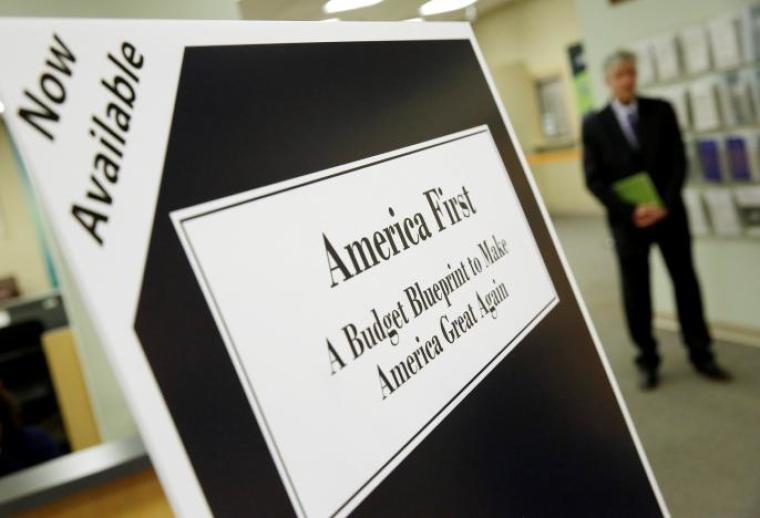Christian leaders decry Trump's foreign aid cuts

Over 100 Christian leaders have affixed their signature to a letter urging Congress to reject President Donald Trump's proposal to make disproportionate cuts to foreign aid funding.
The budget blueprint, released by the Trump administration on Thursday, included a proposal to reduce the State Department and U.S. Agency for International Development's (USAID) budget by 28 percent, according to Christianity Today.
In the statement included with the blueprint, Trump argued that "it is time to prioritize the security and well-being of Americans, and to ask the rest of the world to step up and pay its fair share."
In the letter sent to House and Senate majority and minority leadership on Thursday, Christian leaders and celebrities called on the legislators to avoid making "disproportionate" cuts to foreign aid programs that provide support to the impoverished, starving and displaced people abroad.
"As followers of Christ, it is our moral responsibility to urge you to support and protect the International Affairs Budget, and avoid disproportionate cuts to these vital programs that ensure that our country continues to be the 'shining city upon a hill,'" the letter stated, according to The Christian Post.
The letter was signed by leaders from humanitarian aid groups including World Vision USA, World Relief, Compassion International, and Food for the Hungry. Other signatories include Samuel Rodriguez, president of the National Hispanic Christian Leadership Conference; Ronnie Floyd, former president of the Southern Baptist Convention; Cardinal Timothy Dolan, Archbishop of New York; evangelical author and human rights advocate Johnnie Moore and many others.
The Christian leaders urged the government to maintain the international programs they consider "instrumental in saving lives, safeguarding religious liberties, and keeping America safe and secure." They also contended that the International Affairs Budget, which is used to fund health clinics and schools in developing nations and humanitarian relief programs, is "crucial" to demonstrating American values, building "friendships with other nations" and "lowering security risks around the world."
During the previous administration, most evangelicals supported making cuts to U.S. assistance to the world's poor. Other top choices for spending reductions were government assistance for the unemployed and environmental protection.
The budget blueprint also includes a proposal to reduce the U.S. assessed contribution for U.N. global peacekeeping missions to 25 percent at most, which is consistent with the U.S. law that sets a 25 percent cap on peacekeeping funding. The U.S. currently contributes about 28 percent of the peacekeeping budget.
 Christians don't have to affirm transgenderism, but they can’t express that view at work: tribunal
Christians don't have to affirm transgenderism, but they can’t express that view at work: tribunal Archaeology discovery: Medieval Christian prayer beads found on Holy Island
Archaeology discovery: Medieval Christian prayer beads found on Holy Island Presbyterian Church in America votes to leave National Association of Evangelicals
Presbyterian Church in America votes to leave National Association of Evangelicals Over 50 killed in 'vile and satanic' attack at Nigerian church on Pentecost Sunday
Over 50 killed in 'vile and satanic' attack at Nigerian church on Pentecost Sunday Ukrainian Orthodox Church severs ties with Moscow over Patriarch Kirill's support for Putin's war
Ukrainian Orthodox Church severs ties with Moscow over Patriarch Kirill's support for Putin's war Islamic State kills 20 Nigerian Christians as revenge for US airstrike
Islamic State kills 20 Nigerian Christians as revenge for US airstrike Man who served 33 years in prison for murder leads inmates to Christ
Man who served 33 years in prison for murder leads inmates to Christ


 Nigerian student beaten to death, body burned over ‘blasphemous’ WhatsApp message
Nigerian student beaten to death, body burned over ‘blasphemous’ WhatsApp message 'A new low': World reacts after Hong Kong arrests 90-year-old Cardinal Joseph Zen
'A new low': World reacts after Hong Kong arrests 90-year-old Cardinal Joseph Zen Iran sentences Christian man to 10 years in prison for hosting house church worship gathering
Iran sentences Christian man to 10 years in prison for hosting house church worship gathering French Guyana: Pastor shot dead, church set on fire after meeting delegation of Evangelicals
French Guyana: Pastor shot dead, church set on fire after meeting delegation of Evangelicals ‘Talking Jesus’ report finds only 6% of UK adults identify as practicing Christians
‘Talking Jesus’ report finds only 6% of UK adults identify as practicing Christians Mission Eurasia ministry center blown up in Ukraine, hundreds of Bibles destroyed: 'God will provide'
Mission Eurasia ministry center blown up in Ukraine, hundreds of Bibles destroyed: 'God will provide' Church holds service for first time after ISIS desecrated it 8 years ago
Church holds service for first time after ISIS desecrated it 8 years ago Burger King apologizes for 'offensive campaign' using Jesus' words at the Last Supper
Burger King apologizes for 'offensive campaign' using Jesus' words at the Last Supper Uganda: Muslims abduct teacher, burn him inside mosque for praying in Christ’s name
Uganda: Muslims abduct teacher, burn him inside mosque for praying in Christ’s name